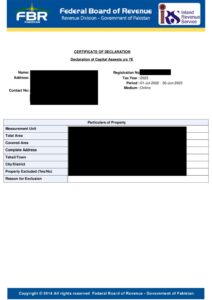Tax Exemptions:
Are you a returning expatriate or a short-term resident in Pakistan? Understanding the tax regulations can help you navigate through potential exemptions. In this blog, we’ll explore key provisions under the Income Tax Ordinance related to returning expatriates and short-term residents.
Returning Expatriate [S51(1)]:
If you were a resident in a tax year but non-resident in the preceding four tax years, you qualify as a returning expatriate. The good news is that all foreign-source income will be exempt from taxation in the tax year you become a resident and the following tax year. This provision aims to encourage individuals to return to Pakistan by providing a temporary relief from taxation on their foreign earnings.

Income tax Ordinance 2001 Wording:
50.Foreign-source income of returning expatriates:
Any foreign source income derived by a citizen of Pakistan in a tax year who was not a resident
individual in any of the four tax years preceding the tax year in which the individual
became a resident shall be exempt from tax under this Ordinance in the tax year
in which the individual became a resident individual and in the following tax year.
Examples:
Meet Ali, who was a resident in Pakistan four years ago but has been working abroad since then. In the tax year he returns to Pakistan and the subsequent year, Ali’s foreign-source income will be fully exempt from taxation. This provision aims to attract individuals like Ali back to Pakistan by providing a temporary relief from taxes on their foreign earnings.
Citizen of Pakistan Leaves Pakistan [S-51(2)]:
For citizens of Pakistan leaving the country during a tax year and remaining abroad, the tax law offers a unique exemption. Any salary earned outside Pakistan during this period shall be exempt from taxation. This provision recognizes the challenges faced by citizens working abroad and provides a tax break on their foreign-earned income.

Income tax Ordinance 2001 Wording:
50.Foreign-source income of returning expatriates:
[(2) Where a citizen of Pakistan leaves Pakistan during a tax year and
remains abroad during that tax year, any income chargeable under the head
“Salary” earned by him outside Pakistan during that year shall be exempt from tax
under this Ordinance.]
Examples:
Consider Sara, a Pakistani citizen who leaves the country for employment opportunities abroad. While she remains abroad during a tax year, any salary she earns outside Pakistan during this period will be exempt from taxation. This provision acknowledges the challenges faced by citizens working abroad and offers a tax break on their foreign-earned income.
Foreign Source Salary of Resident [S-102]:
Residents in Pakistan earning a salary from foreign sources can benefit from exemptions under Section 102. The salary will be exempt if either the individual pays foreign tax on it or the employer withholds and pays it to the revenue authority of the foreign country. This encourages compliance with foreign tax regulations and ensures that individuals are not subject to double taxation on their foreign income.
Income tax Ordinance 2001 Wording:
102.Foreign source salary of resident individuals.
(1) Any foreign-source
salary received by a resident individual shall be exempt from tax if the individual
has paid foreign income tax in respect of the salary.
(2) A resident individual shall be treated as having paid foreign income
tax in respect of foreign-source salary if tax has been withheld from the salary by
the individual’s employer and paid to the revenue authority of the foreign country
in which the employment was exercised.
Examples:
Ahmed, a resident in Pakistan, works for an international company and earns a salary from foreign sources. Under Section 102, Ahmed’s foreign-source salary will be exempt from taxation if he either pays foreign tax on it or if his employer withholds and pays it to the revenue authority of the foreign country. This encourages compliance with foreign tax regulations and prevents double taxation on foreign income.
Short-term Resident [S-50]:
If you find yourself in Pakistan for a short duration due to employment reasons, certain provisions apply to exempt Foreign Source Income (FSI). To qualify for this exemption, you must meet the following conditions:
- Resident Solely by Reason of Employment: Your residence status should be solely because of employment.
- Present in Pakistan for 3 Years or Less: Your stay in Pakistan should not exceed three years.
Exceptions to this exemption include income from a business established in Pakistan and foreign source income brought into or received in Pakistan. This ensures that only specific types of income are eligible for exemption under this provision.
Income tax Ordinance 2001 Wording:
50.Foreign-source income of short-term resident individuals.— (1)
Subject to sub-section (2), the foreign-source income of an individual 3
[ ] —
(a) who is a resident individual solely by reason of the individual’s
employment; and
(b) who is present in Pakistan for a period or periods not exceeding
three years,
shall be exempt from tax under this Ordinance.
(2) This section shall not apply to —
(a) any income derived from a business of the person established
in Pakistan; or
(b) any foreign-source income brought into or received in Pakistan
by the person.
Examples:
Meet Maya, who is in Pakistan for a short duration due to employment. To qualify for FSI exemption, Maya must meet two conditions: her residence status should be solely due to employment, and she should be present in Pakistan for three years or less. Exceptions include income from a business established in Pakistan and foreign source income brought into or received in Pakistan. This ensures that only specific types of income are eligible for exemption under this provision.
If you need further guidance or services tailored to your unique situation, feel free to contact us. We are here to provide the best consultation and tax advice to ensure your financial affairs are in optimal order. Your peace of mind is our priority! We appreciate your support and engagement. Stay tuned for more insights into tax and finance matters. Your prayers inspire our commitment to providing valuable financial guidance.







